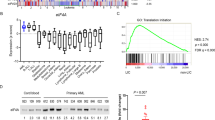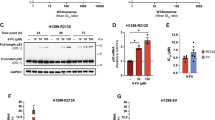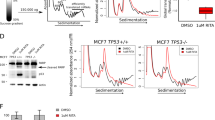Abstract
The translation initiation factor, eIF4E, is commonly overexpressed in solid tumors. This elevation allows for efficient translation of mRNA that are normally repressed by their 5′ untranslated region, many of which encode growth-promoting proteins. This property was exploited to modulate the synthesis of HTK at the translational level to selectively kill cancer cells. Various breast cancer cell lines can efficiently synthesize HTK from the translationally regulated mRNA, whereas normal cells cannot. Accordingly, only cancer cells were killed at low concentrations of ganciclovir. By altering the expression of eIF4E, it was possible to modulate the sensitivity of various cell lines to ganciclovir.
This is a preview of subscription content, access via your institution
Access options
Subscribe to this journal
Receive 12 print issues and online access
$259.00 per year
only $21.58 per issue
Buy this article
- Purchase on Springer Link
- Instant access to full article PDF
Prices may be subject to local taxes which are calculated during checkout



Similar content being viewed by others
References
Gomez-Navarro J, Curiel DT, Douglas JT . Gene therapy for cancer Eur J Cancer 1999 35: 867–885
Nishiyama Y, Rapp F . Anticellular effects of 9-(2-hydroxyethoxymethyl) guanine against herpes simplex virus–transformed cells J Gen Virol 1979 45: 227–230
Anderson LM, Swaminathan S, Zackon I, Tajuddin A-K, Thimmapaya, Weitzman SA . Adenovirus-mediated tissue-targeted expression of the HSVtk gene for the treatment of breast cancer Gene Ther 1999 6: 854–864
Binley K, Iqball S, Kingsman A, Naylor S . An adenoviral vector regulated by hypoxia for the treatment of ischaemic disease and cancer Gene Ther 1999 6: 1721–1727
Crew JP, Fuggle S, Bicknell R, Cranston DW, de Benedetti A, Harris AL . Eukaryotic initiation factor-4E in superficial and muscle invasive bladder cancer and its correlation with vascular endothelial growth factor expression and tumour progression Br J Cancer 2000 82: 161–166
Kerekatte V, Smiley K, Hu B, Smith A, Gelder F, De Benedetti A . The proto-oncogene/translation initiation factor eIF4E: a survey of its expression in breast carcinomas Int J Cancer 1995 64: 27–31
Turbat-Herrera E, Tucker A, Black D et al. Increase in eIF4E Protein and Neovascularization in Cervical Carcinoma Oklahoma City, Oklahoma: Southwestern Association for Clinical Microbiology Meeting 1999 8: Abstract
Rosenwald IB, Chen JJ, Wang S, Savas L, London IM, Pullman J . Upregulation of protein synthesis initiation factor eIF4E is an early event during colon carcinogenesis Oncogene 1999 18: 2507–2517
Nathan CO, Liu L, Li B, Abreo F, Nandy I, De Benedetti A . Detection of the proto-oncogene eIF4E in surgical margins may predict recurrence in head and neck cancer Oncogene 1997 15: 579–584
Williams BJ, Eastam JA, Venable DD, De Benedetti A, Acree DT . The Effect of the Translation Initiation Factor EIF4E on VEGF and Angiogenesis in Prostate Cancer Orlando, FL: American Association for Cancer Research Special Conference in Cancer Research: Angiogenesis and Cancer 1998 B69–B70
Miyagi Y, Sugiyama A, Asai A, Okazaki T, Kuchino Y, Kerr S . Elevated levels of eukaryotic initiation factor eIF-4E mRNA in a broad spectrum of transformed cell lines Cancer Lett 1995 91: 247–252
Anthony B, Carter P, De Benedetti A . Overexpression of the protooncogene-translation factor eIF-4E in breast carcinoma cell lines Int J Cancer 1996 65: 858–863
Rosenwald IB . Upregulated expression of the genes encoding translation initiation factors eIF-4E and eIF-2alpha in transformed cells Cancer Lett 1996 102: 113–123
Clemens MJ, Bommer UA . Translational control: the cancer connection Int J Biochem Cell Biol 1999 31: 1–23
De Benedetti A, Harris A . eIF4E expression in tumors: its possible role in progression of malignancies Int J Biochem Cell Biol 1999 31: 59–72
Kevil C, Carter P, Hu B, De Benedetti A . Translational enhancement of FGF-2 by eIF-4 factors, alternate utilization of CUG and AUG codons for translation initiation Oncogene 1995 11: 2339–2348
De Benedetti A, Rhoads RE . A novel BK virus–based episomal vector for expression of foreign genes in mammalian cells Nucleic Acids Res 1991 19: 1925–1931
Shimasaki S, Emoto N, Koba A et al. Complementary DNA cloning and sequencing of rat ovarian basic fibroblast growth factor and tissue distribution study of its mRNA Biochem Biophys Res Commun 1988 157: 256–263
De Benedetti A, Joshi-Barve S, Rinker-Schaeffer CW, Rhoads RE . Expression of antisense RNA against initiation factor eIF-4E mRNA in HeLa cells results in lengthened cell division times, diminished translation rates, and reduced levels of both eIF-4E and the P220 component of eIF-4F Mol Cell Biol 1991 11: 5435–5445
Li P-X, Ngo D, Brade AM, Klamut HJ . Differential chemosensitivity of breast cancer cells to ganciclovir treatment following adenovirus-mediated herpes simplex virus thymidine kinase gene transfer Cancer Gene Ther 1999 6: 179–190
Beck C, Cayeux S, Lupton SD, Dorken B, Blankstein T . The thymidine kinase/ganciclovir–mediated “suicide” effect is variable in different tumor cells Hum Gene Ther 1995 6: 1525–1530
Sturtz FG, Waddell K, Shulok J et al. Variable efficiency of the thymidine kinase/ganciclovir system in human glioblastoma cell lines: implications for gene therapy Hum Gene Ther 1997 8: 1945–1953
Loubiere L, Tiraby M, Cazaux C et al. The equine herpes virus 4 thymidine kinase is a better suicide gene than the human herpes virus 1 thymidine kinase Gene Ther 1999 6: 1638–1642
Simon SM, Schindler M . Cell biological mechanisms of multidrug resistance in tumors Proc Natl Acad Sci 1994 91: 3497–3504
Galski H, Sullivan M, Willingham MC et al. Expression of a human multidrug resistance cDNA (MDRI) in the bone marrow of transgenic mice: resistance to daunomycin-induced leukopenia Mol Cell Biol 1989 9: 4357–4363
Goldstein LJ, Pastan I, Gottesman MM . Multidrug resistance in human cancer Crit Rev Oncol/Hematol 1992 12: 243–253
Moolten FL . Tumor chemosensitivity conferred by inserted herpes thymidine kinase genes: paradigm for a prospective cancer control strategy Cancer Res 1986 46: 5276–5281
Roth JA, Cristiano RJ . Gene therapy for cancer: what have we done and where are we going? J Natl Cancer Inst 1997 89: 21–39
Klatzmann D, Valery CA, Bensimon G et al. The study group on gene therapy for glioblastoma. A phase I/II study of herpes simplex virus type 1 thymidine kinase “suicide” gene therapy for recurrent glioblastoma Hum Gene Ther 1998 9: 2595–2604
Herman JR, Adler HL, guilarCordova EA et al. In situ gene therapy for adenocarcinoma of the prostate: a phase I clinical trial Hum Gene Ther 1999 10: 1239–1249
Ramesh R, Marrogi AJ, Munshi A, Abboud CN, Freeman SM . In vivo analysis of the “bystander effect”: a cytokine cascade Exp Hematol 1996 24: 829–838
Long Z, Lu P, Grooms T et al. Molecular evaluation of biopsy and autopsy specimens from patients receiving in vivo retroviral gene therapy Hum Gene Ther 1999 10: 733–740
Kaloss M, Linscott M, Wey C et al. Distribution of retroviral vectors and vector producer cells using two routes of administration in rats Gene Ther 1999 6: 1389–1396
Acknowledgements
This work was supported by NIH Grant CA69148.
Author information
Authors and Affiliations
Corresponding author
Rights and permissions
About this article
Cite this article
DeFatta, R., Li, Y. & De Benedetti, A. Selective killing of cancer cells based on translational control of a suicide gene. Cancer Gene Ther 9, 573–578 (2002). https://doi.org/10.1038/sj.cgt.7700468
Received:
Published:
Issue Date:
DOI: https://doi.org/10.1038/sj.cgt.7700468
Keywords
This article is cited by
-
Fibroblast growth factor and ornithine decarboxylase 5′UTRs enable preferential expression in human prostate cancer cells and in prostate tumors of PTEN−/− transgenic mice
Cancer Gene Therapy (2012)
-
A programmable NOR-based device for transcription profile analysis
Scientific Reports (2012)
-
Development of Chimeric Gene Regulators for Cancer-specific Gene Therapy with both Transcriptional and Translational Targeting
Molecular Biotechnology (2010)
-
Mechanisms of translational deregulation in human tumors and therapeutic intervention strategies
Oncogene (2007)
-
Targeting and killing of prostate cancer cells using lentiviral constructs containing a sequence recognized by translation factor eIF4E and a prostate-specific promoter
Cancer Gene Therapy (2006)



